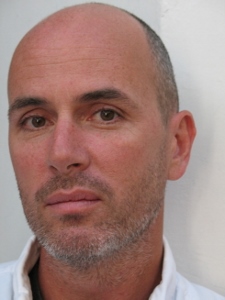
18 Things I Love about “What Is Left to Say about the Body”
Contributor’s Marginalia: Michael Bazzett on a poem by Stevie Edwards
1. The simplicity of the language. I don’t think there’s a word here that most 9 year-olds couldn’t handle.
2. Yet Edwards makes a lament out of that lexicon that had me staring out the window for a while.
3. And I love the Proustian catapult of that enjambment in the opening stanza: It’s hot, the phone is ringing, and I am
4. launched through the past into another decade,
another hot room, another ringing phone.
5. It makes me think that there’s no better way to time travel than via poem. Just break the syntax, change the tense.
6. When I saw The Terminator as a teenager I decided that, should I ever encounter a time machine, I would simply grow a mustache, so I could tell myself apart. I don’t know why I assumed my past or future self would be stalking me, but it seemed a given. Maybe time travel and fatal reckonings go hand in hand.
7. I love the we first meet the body from the title as a body / named Charles that went by Chad. Two short stanzas later he has become body again. Our names are temporary.
8. And I love that both of those bodies land at the end of lines
9. that are enjambed. Because lines end but life persists.
10. And of all things, it is asthma that undoes him. Who hasn’t known someone with asthma?
11. A saxophone with no wind in it. No wind. The instrument fallen silent. The poem only employs a few metaphors, but they’re apt.
12. And I love that breathless moment when Chad reaches for her. Then
reaches for his inhaler. It would be gently comic if only …
13. Well, perhaps it is gently comic. And wonderfully tender. Because he’s still with us in that moment. In those middle two stanzas. In the eternal now of the poem.
14. He touched her. And by the end he could only / be touched and did nothing to the world.
15. My mind drifts back to that image. A saxophone with no wind in it. I think I’d read the poem a dozen times before I noticed this sentence has no verb.
16. But I think I’d felt that the sentence has no verb.
17. And so I love how elegantly and inevitably the poem funnels into that stunning final line: He had no verb left.
18. And leaves me breathless.
